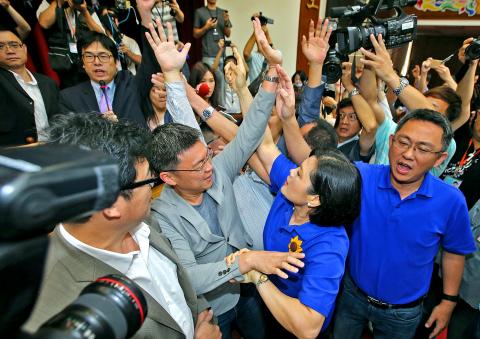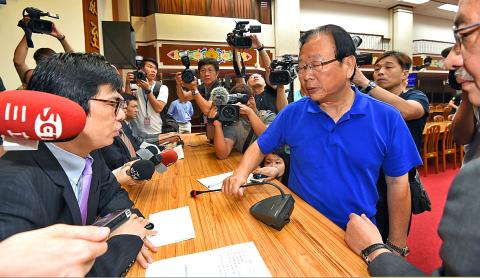Scuffles among lawmakers broke out in the legislature in Taipei yesterday as a combined session completed the final procedural step before sending draft legislation targeting “illicit party assets” into cross-caucus negotiations.
A combined session of the Legislative Yuan’s Internal Administration Committee, the Judiciary and Organic Laws and Statues Committee, and the Finance Committee on Monday passed the draft legislation after Chinese Nationalist Party (KMT) legislators stormed out of a review session at which they used extended “procedural remarks” to slow the progress of a Democratic Progress Party (DPP)-sponsored proposal.
Yesterday’s session was to confirm Monday’s meeting minutes to enable the draft act to be sent out of committee ahead of a five-day recess, including the Dragon Boat Festival, and before KMT Legislator Huang Chao-shun (黃昭順) is scheduled to take her turn in the rotation as convener of the Internal Administration Committee next week.

Photo: CNA
Members of the New Power Party caucus arrived early to prevent KMT legislators from occupying the convener’s podium — a strategy commonly used by members of the opposition to impede proceedings.
After the reading of the official rendition of Monday’s minutes, session convener Chen Chi-mai (陳其邁) — a DPP legislator — finalized the minutes while KMT lawmakers voiced objections, sparking retorts from the DPP and leading to shouting from both sides.
“We have objections — you have not let me speak about procedure,” KMT caucus Secretary-General Lin Te-fu (林德福) said, repeatedly grabbing microphones away from Chen and at one point slamming a microphone against the podium.

Photo: Liu Hsin-de, Taipei Times
Following several minutes of shouting, Chen called for a vote on a DPP motion to adjourn, leading to tussles as several KMT legislators charged the convener’s podium, with Lin wrenching the microphone away from Chen immediately after he announced the passage of the adjournment motion.
“We have a right to give procedural remarks and we registered, but they refused to give us an opportunity to express our views,” KMT Legislator Chang Li-shan (張麗善) said as her colleagues shouted slogans accusing the DPP of using “majority violence” and imposing “green terror.”
“A motion to adjourn takes priority — those are the ABCs of procedural rules,” Chen said. “The KMT should familiarize itself with procedural rules and make its opinions known during the substantive review process, rather than resorting to a flustered and reckless procedural boycott.”
Declaring whether to finalize meeting minutes is to be done at the discretion of committee conveners according to the Rules of Procedure of the Legislative Yuan, he said, adding that the regulations stipulate any objections to the wording of the documents should be submitted in writing — ruling out the use of procedural remarks.
“All of this stalling is to protect the KMT’s assets, but [KMT lawmakers] seem to think that acting as the opposition is just a matter of putting on a new uniform,” said DPP Legislator Chuang Jui-hsiung (莊瑞雄), referring to blue polo shirts and jeans KMT legislators wore at the session.
“They have forgotten to do their homework,” Chuang said, adding that former legislative speaker Wang Jin-pyng (王金平) — a KMT legislator — had issued a ruling stating that finalizing committee minutes was not subject to a vote.
The draft bill now moves to cross-caucus negotiations, with a vote expected early next month following the discussions.

Intelligence agents have recorded 510,000 instances of “controversial information” being spread online by the Chinese Communist Party (CCP) so far this year, the National Security Bureau (NSB) said in a report yesterday, as it warned of artificial intelligence (AI) being employed to generate destabilizing misinformation. The bureau submitted a written report to the Legislative Yuan in preparation for National Security Bureau Director-General Tsai Ming-yen’s (蔡明彥) appearance before the Foreign Affairs and National Defense Committee today. The CCP has been using cognitive warfare to divide Taiwanese society by commenting on controversial issues such as Taiwan Semiconductor Manufacturing Co’s (TSMC, 台積電) investments in the

HELPING HAND: The steering committee of the National Stabilization Fund is expected to hold a meeting to discuss how and when to utilize the fund to help buffer the sell-off The TAIEX plunged 2,065.87 points, or 9.7 percent, to close at 19,232.35 yesterday, the highest single-day percentage loss on record, as investors braced for US President Donald Trump’s tariffs after an extended holiday weekend. Amid the pessimistic atmosphere, 945 listed companies led by large-cap stocks — including Taiwan Semiconductor Manufacturing Co (TSMC, 台積電), Hon Hai Precision Industry Co (鴻海精密) and Largan Precision Co (大立光) — fell by the daily maximum of 10 percent at the close, Taiwan Stock Exchange data showed. The number of listed companies ending limit-down set a new record, the exchange said. The TAIEX plunged by daily maxiumu in just

INVESTIGATION: The case is the latest instance of a DPP figure being implicated in an espionage network accused of allegedly leaking information to Chinese intelligence Democratic Progressive Party (DPP) member Ho Jen-chieh (何仁傑) was detained and held incommunicado yesterday on suspicion of spying for China during his tenure as assistant to then-minister of foreign affairs Joseph Wu (吳釗燮). The Taipei District Prosecutors’ Office said Ho was implicated during its investigation into alleged spying activities by former Presidential Office consultant Wu Shang-yu (吳尚雨). Prosecutors said there is reason to believe Ho breached the National Security Act (國家安全法) by leaking classified Ministry of Foreign Affairs information to Chinese intelligence. Following interrogation, prosecutors petitioned the Taipei District Court to detain Ho, citing concerns over potential collusion or tampering of evidence. The

‘COMPREHENSIVE PLAN’: Lin Chia-lung said that the government was ready to talk about a variety of issues, including investment in and purchases from the US The National Stabilization Fund (NSF) yesterday announced that it would step in to staunch stock market losses for the ninth time in the nation’s history. An NSF board meeting, originally scheduled for Monday next week, was moved to yesterday after stocks plummeted in the wake of US President Donald Trump’s announcement of 32 percent tariffs on Taiwan on Wednesday last week. Board members voted to support the stock market with the NT$500 billion (US$15.15 billion) fund, with injections of funds to begin as soon as today. The NSF in 2000 injected NT$120 billion to stabilize stocks, the most ever. The lowest amount it